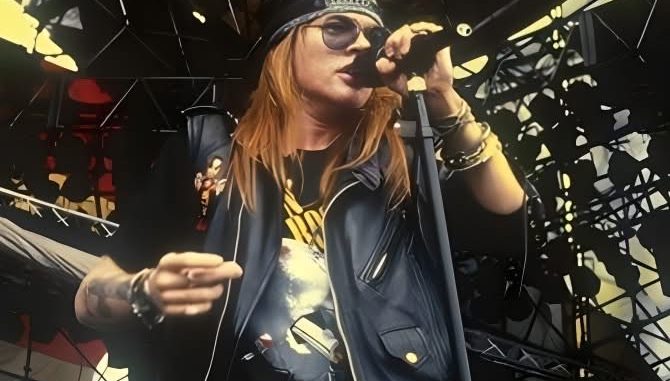
In the sweltering heat of August 20, 1988, more than 100,000 fans packed into Castle Donington Raceway in Leicestershire, England, for the legendary Monsters of Rock Festival. The lineup was stacked with heavyweights — Iron Maiden, KISS, Megadeth, and David Lee Roth, to name a few — but the band that drew the most attention, both for their meteoric rise and the chaos that followed, was Guns N’ Roses. Front and center was their electrifying, unpredictable frontman: Axl Rose. His performance that day cemented his reputation as one of the most magnetic and volatile figures in hard rock.
By the summer of 1988, Guns N’ Roses were no longer just the new kids from Los Angeles. Their debut album, Appetite for Destruction, released a year earlier, had already exploded into a phenomenon. Songs like Sweet Child o’ Mine, Welcome to the Jungle, and Paradise City had taken over radio and MTV, turning the band into global superstars almost overnight. Donington was their biggest festival stage yet — a chance to prove they could hold their own before the toughest of rock crowds.
From the moment Axl Rose stepped onto the stage in his ripped jeans, bandana, and signature swagger, he commanded the crowd’s attention. His voice, a feral mix of snarls and soaring high notes, carried across the massive field like a battle cry. The band tore into their setlist with blistering energy, launching with It’s So Easy and Mr. Brownstone. Axl, never one to simply stand still, darted across the stage, whipping the audience into a frenzy with his unpredictable energy. He seemed to embody the spirit of danger and rebellion that Guns N’ Roses had built their identity on.
Yet, the performance was not without tragedy. The sheer intensity of the crowd pressed against the stage barriers created a deadly situation. During the band’s set, two fans were crushed and lost their lives in the chaos. Despite the tragedy, which unfolded as the festival continued, Axl pushed forward with the performance, a mixture of defiance, professionalism, and perhaps unawareness of the full scale of what had happened in real time. For many fans, the memory of that day is bittersweet: the raw power of one of the greatest live bands of their era, forever shadowed by loss.
Musically, though, Guns N’ Roses delivered a set that highlighted their dangerous appeal. Slash’s gritty guitar riffs slashed through the air, Duff McKagan’s bass thundered beneath it, and Steven Adler’s drumming gave the songs their pounding heart. But it was Axl Rose who turned the show into something unforgettable. His ability to shift from a venomous snarl in Out Ta Get Me to the tender vulnerability of Sweet Child o’ Mine demonstrated the duality that made him such a compelling frontman.
Critics and fans alike noted how Axl thrived on the tension between control and chaos. At Donington, he was both conductor and instigator, urging the crowd to let loose while pushing himself to the limit. Every growl, every scream, every sudden sprint across the stage reinforced his image as a rock star who lived entirely on the edge. That edge, however, was also what made Guns N’ Roses dangerous in a way few bands were.
In hindsight, Donington 1988 became one of the pivotal moments in the band’s history. The tragedy underscored the volatile relationship between rock music and mass crowds, while Axl Rose’s performance showcased both the brilliance and unpredictability that defined his career. For the band, it was proof they could command one of the world’s largest festival stages. For Axl, it was another step toward his transformation into a rock icon — loved, hated, and always unforgettable.
The following years would see Guns N’ Roses conquer arenas and stadiums worldwide, but Donington remained a milestone. It was the day they showed the rock world that their power wasn’t confined to Hollywood clubs or U.S. stages — they could ignite a crowd anywhere, even in the crucible of one of the most demanding festivals on earth.
Today, nearly four decades later, Axl Rose’s performance at Donington is remembered not just for the tragedy but for the undeniable fire he brought to the stage. It stands as a reminder of the raw, unpolished danger of Guns N’ Roses at their peak: a band that didn’t just play rock and roll but lived it to its fullest extremes, for better and for worse.
Would you like me to also build a song-by-song breakdown of their Donington setlist, focusing on how Axl delivered each one that day?
Leave a Reply